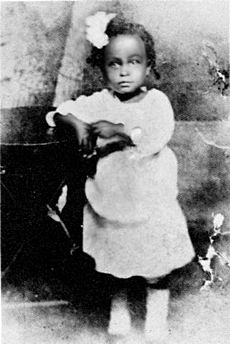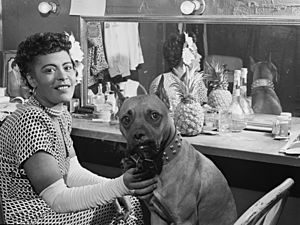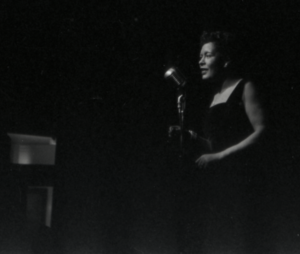Billie Holiday facts for kids
Quick facts for kids
Billie Holiday
|
|
|---|---|
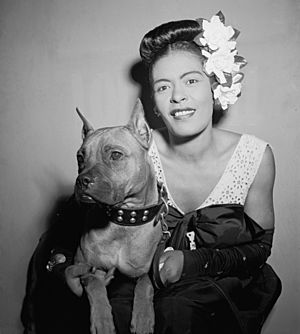
Holiday with her dog, Mister c. 1947
|
|
| Born |
Eleanora Fagan
April 7, 1915 |
| Died | July 17, 1959 (aged 44) New York City, U.S.
|
| Resting place | Saint Raymond's Cemetery |
| Other names | Lady Day |
| Occupation | Singer |
| Years active | c. 1930–1959 |
| Spouse(s) |
Jimmy Monroe
(m. 1941; div. 1947)Joe Guy
(m. 1951; div. 1957)Louis McKay
(m. 1957) |
| Musical career | |
| Genres | |
| Labels | |
| Associated acts |
|
| Signature | |
 |
|
Billie Holiday (born Eleanora Fagan; April 7, 1915 – July 17, 1959) was a famous American jazz and swing music singer. She had a huge impact on jazz and pop singing. People knew her for her special way of singing and her amazing ability to make up music on the spot.
Contents
Early Life of Billie Holiday
Eleanora Fagan was born on April 7, 1915, in Philadelphia. Her young parents were Clarence Halliday and Sarah Julia "Sadie" Fagan. Soon after Eleanora was born, her father left to become a jazz musician.
Eleanora grew up in Baltimore and had a tough childhood. Her mother often worked on passenger trains, so Eleanora lived with her aunt and her aunt's mother-in-law. She spent her first ten years mostly being cared for by others.
After kindergarten, she often skipped school. When she was nine, she was sent to a special school for girls. After nine months, she returned to her mother. Her mother had opened a restaurant, and they both worked long hours there. Billie left school when she was 11.
At 12, she cleaned homes to earn money. Around this time, she first heard the music of Louis Armstrong and Bessie Smith. By late 1928, her mother moved to Harlem, New York, and Billie stayed with her aunt's mother-in-law again. Billie joined her mother in Harlem in early 1929.
Billie Holiday's Music Career
After a difficult childhood, Billie Holiday started singing in nightclubs in Harlem. A music producer named John Hammond heard her and loved her voice.
She chose her stage name, Billie Holiday, from an actress she admired, Billie Dove. She also used her father's last name, Halliday, but later changed it to Holiday.
She signed a record deal with Brunswick in 1935. Working with Teddy Wilson, she had a hit song called "What a Little Moonlight Can Do". This song became a famous jazz tune.
In 1937, Billie had 16 best-selling songs, making it her most successful year. Her song "Carelessly" was her only number one hit on the pop charts in the 1930s. Another hit, "I've Got My Love to Keep Me Warm", was also very popular.
In 1938, Billie joined Artie Shaw's band. This was a big deal because she was one of the first Black women to sing with a white orchestra. It was also the first time a Black female singer toured the segregated U.S. South with a white bandleader. Artie Shaw often stood up for Billie when there were problems due to racial tension.
In 1939, Billie recorded her biggest selling song, "Strange Fruit." This powerful song reached number 16 on the pop charts.
Throughout the 1930s and 1940s, Billie Holiday was very successful with record labels like Columbia and Decca. In 1946, she starred in her only major film, New Orleans, with Louis Armstrong.
She continued to be a popular concert performer in the 1950s, selling out two shows at Carnegie Hall. Her later recordings were met with mixed reviews, but they still sold well. Her last album, Lady in Satin, came out in 1958.
Billie Holiday's Singing Style
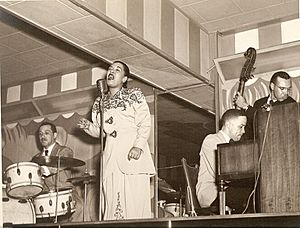
Billie Holiday's unique way of singing made her performances special. She was great at improvising, which means making up music as she went along. This helped her because she didn't have much formal music training. Billie said she always wanted her voice to sound like a musical instrument. She was inspired by singers like Louis Armstrong and Bessie Smith.
The famous singer Frank Sinatra was greatly influenced by Billie Holiday. He once said that almost every major pop singer of his time was touched by her amazing talent. He called her the "greatest single musical influence" on him.
Billie Holiday's Personal Life
Billie Holiday was married three times. Her first husband was James Monroe, whom she married in 1941. They divorced in 1947.
Her second husband was Joe Guy. They married in 1951 and divorced in 1957.
Soon after, she married Louis McKay, her third and final husband. They were separated when she passed away.
Billie Holiday had two godchildren: a singer named Billie Lorraine Feather and Bevan Dufty.
Billie Holiday's Death
Billie Holiday passed away on July 17, 1959, when she was 44 years old. Her funeral was held in Manhattan, New York. She was buried at Saint Raymond's Cemetery in the Bronx.
Cool Facts About Billie Holiday
- Her friend and music partner, Lester Young, gave her the nickname "Lady Day".
- Billie Holiday was friends with the popular singer Ella Fitzgerald.
- She wrote a book about her life called Lady Sings the Blues, which was published in 1956.
- Billie Holiday won four Grammy Awards after she passed away. These were for her historical recordings.
- She was honored in the Grammy Hall of Fame and the National Rhythm & Blues Hall of Fame.
- In 2000, she was also added to the Rock & Roll Hall of Fame for her early influence on music.
- NPR named her one of the 50 Great Voices. Rolling Stone magazine ranked her fourth on their list of "200 Greatest Singers of All Time" in 2023.
- Several movies have been made about her life, including The United States vs. Billie Holiday (2021).
- A statue of Billie Holiday was put up in Baltimore in 1985. It was finished in 1993 with extra pictures inspired by her song Strange Fruit.
- The Billie Holiday Monument is in Baltimore's Upton neighborhood.
- In 2019, New York City announced they would build a statue honoring Billie Holiday.
- The song "Angel of Harlem" by the Irish rock band U2 was written to honor Billie Holiday.
Billie Holiday's Famous Sayings
- "If I'm going to sing like someone else, then I don't need to sing at all."
- "Sometimes it's worse to win a fight than to lose."
- "If I don't have friends, then I ain't got nothing."
Movies and Plays About Billie Holiday
- The movie Lady Sings the Blues came out in 1972. It was based on Billie's autobiography and starred Diana Ross.
- Another movie, The United States vs. Billie Holiday, was released in 2021. It starred Andra Day.
- Billie Holiday is the main character in the play Lady Day at Emerson's Bar and Grill.
- Billie is a 2019 documentary film. It uses old interviews from the 1970s.
Images for kids
-
Holiday, photographed by Carl Van Vechten in 1949
- Billie Holiday Sings (1952)
- An Evening with Billie Holiday (1953)
- Billie Holiday (1954)
- Music for Torching (1955)
- Velvet Mood (1956)
- Lady Sings the Blues (1956)
- Body and Soul (1957)
- Songs for Distingué Lovers (1957)
- Stay with Me (1958)
- All or Nothing at All (1958)
- Lady in Satin (1958)
- Last Recording (1959)
See also
 In Spanish: Billie Holiday para niños
In Spanish: Billie Holiday para niños
- List of awards and nominations received by Billie Holiday
- List of Rock and Roll Hall of Fame inductees
 | Jessica Watkins |
 | Robert Henry Lawrence Jr. |
 | Mae Jemison |
 | Sian Proctor |
 | Guion Bluford |


